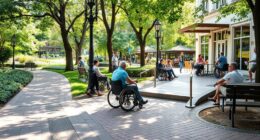Regular cardio workouts are essential for boosting your heart health as you age. Engaging in low-impact activities like walking, swimming, or cycling for at least 150 minutes a week can strengthen your heart and enhance your endurance. You’ll notice improved mood, better cognitive function, and overall well-being. Warm up properly to prevent injury, and stay hydrated throughout your workouts. If you want to learn engaging exercises and motivation strategies to keep you on track, keep going!
Key Takeaways
- Engage in at least 150 minutes of moderate aerobic activity weekly to enhance heart health and overall well-being.
- Low-impact exercises like walking, swimming, and cycling are ideal for seniors to reduce strain while boosting cardiovascular fitness.
- Incorporate warm-up and cool-down routines to prepare your body and aid recovery, preventing injuries during workouts.
- Celebrate small victories and track your progress in a workout journal to maintain motivation and recognize improvements.
- Stay hydrated before, during, and after exercise to support optimal performance and recovery in cardiovascular activities.
The Importance of Cardio for Seniors

As you age, staying active becomes essential for maintaining your health, and cardio workouts play a key role in that process. Engaging in regular cardiovascular exercise greatly reduces your risk of heart disease and stroke, common issues among seniors. Additionally, being aware of common symptoms of various health conditions, including heart disease, can further encourage proactive health management. Studies have shown that filial responsibility laws may influence financial planning for elder care, which can be an important consideration for seniors and their families. Regular physical activity, including cardio, can also help mitigate the effects of Louisiana alimony laws on financial stability during later life. Furthermore, incorporating elements of AI training jobs can provide insights into technology’s role in health management, enhancing your understanding of how to monitor your fitness effectively.
Aim for at least 150 minutes of moderate-intensity cardio per week to boost your heart health and enhance your overall cardiovascular function. Not only does cardio improve blood circulation, but it also supports brain function, reducing the risk of cognitive decline.
Additionally, regular cardio can elevate your mood and alleviate anxiety and depression, contributing to better mental health. By maintaining an active lifestyle, you can effectively manage chronic conditions like diabetes and hypertension, promoting your overall well-being. Furthermore, maintaining involvement in children’s lives can provide an additional source of motivation and joy, further enhancing your emotional well-being.
Low-Impact Cardio Options

When it comes to staying active, low-impact cardio options are a fantastic choice for seniors looking to boost their heart health without putting too much strain on their joints. Incorporating hydration and nutrition into your routine is essential for maximizing the benefits of these exercises. Additionally, engaging in activities with high refresh rates can help maintain motivation by keeping workouts dynamic and enjoyable.
Walking and cycling are excellent ways to improve cardiovascular health while minimizing stress. Many fitness centers offer flexible hours to accommodate seniors’ schedules, making it easier to find time for these activities. Swimming or water aerobics offer a full-body workout, with the buoyancy of water reducing injury risk. Research indicates that low-impact exercises can significantly enhance joint stability, making them ideal for seniors.
You can also incorporate movements like step-touch or marching in place to safely elevate your heart rate, easily adjusting them to fit your fitness level. Regular participation in these activities enhances mobility, endurance, and overall quality of life, contributing to improved heart health and promoting longevity.
Research shows that just 150 minutes of moderate-intensity low-impact cardio per week can lead to improved heart health and lower blood pressure.
Benefits of Regular Cardio Exercise

Regular cardio exercise offers incredible benefits that can really enhance your life. It improves heart function, boosts your endurance, and helps keep your mood stable. Additionally, incorporating stress management techniques into your routine can further support your overall well-being. Engaging in regular cardio can also promote personalized learning pathways that help seniors maintain their cognitive health as they age. Moreover, participating in community-focused exercise programs can foster social change and strengthen connections with others, enhancing the overall experience of physical activity. Furthermore, maintaining high vibrational energy during your workouts can lead to even greater health benefits and a more fulfilling exercise experience. Understanding the importance of emotional stability can also contribute to better overall mental health during your fitness journey.
Improves Heart Function
Cardio exercise greatly boosts heart function, making it crucial for seniors looking to enhance their overall health.
Regular cardiovascular activities, like walking or swimming, considerably improve heart function by enhancing blood circulation. This process helps lower blood pressure and reduces the risk of heart disease. Additionally, maintaining skin hydration through proper hydration can further support overall health during exercise. Engaging in regular cardio can also reduce the risk of unresolved grief, which can negatively impact overall well-being. Moreover, integrating cardio workouts can lead to allergen reduction, improving air quality in indoor environments, which supports better respiratory health.
As you engage in these workouts, you strengthen your heart muscle, increasing its pumping capacity and efficiency. Studies show that seniors who regularly participate in cardio experience improved oxygen uptake, leading to better endurance in daily activities. Additionally, adequate sleep plays a vital role in recovery and overall health, further complementing the benefits of cardio exercise.
Furthermore, consistent aerobic exercise helps regulate cholesterol levels, contributing to healthier arteries. Additionally, sustainable fashion choices, like wearing breathable, eco-friendly materials, can encourage a more enjoyable workout experience.
Enhances Mood Stability
Engaging in cardio exercise not only strengthens your heart but also greatly enhances your mood stability. When you participate in regular cardiovascular activities, like walking or swimming, you release endorphins that uplift your spirits and reduce anxiety and depression. This sense of accomplishment fosters emotional well-being and resilience. Studies show that seniors who commit to cardio workouts experience lower stress levels and better emotional regulation compared to those who are sedentary. Additionally, the practice of reading encouraging quotes can further enhance your mental health as you engage in these activities, promoting a positive mindset. Regular exercise also boosts your immune system through beta-glucans, which can further contribute to overall health and well-being. Furthermore, leafy greens in your diet can support cognitive function, making your workouts even more beneficial. Additionally, establishing a budget for fitness-related expenses can help ensure you consistently prioritize your health and access necessary resources. As you continue to engage in these activities, you may also notice improved cognitive function and memory, leading to fewer mood swings. Ultimately, regular cardio and weight management can markedly boost your life satisfaction and overall quality of life. Furthermore, incorporating mindfulness practices into your routine can further enhance your emotional stability and overall well-being.
Boosts Overall Endurance
When you incorporate consistent aerobic activities into your routine, you’ll quickly notice a boost in your overall endurance. Regular cardio exercise enhances your cardiovascular system, making your heart pump blood more efficiently.
Here are a few key benefits:
- Increased Stamina: You’ll find daily tasks, like grocery shopping or gardening, feel easier and less tiring.
- Reduced Fatigue: Engaging in 150 minutes of aerobic activities weekly helps you tackle your day with renewed energy.
- Improved Lung Capacity: Activities like walking or swimming enhance your breathing efficiency, further boosting overall endurance.
With these benefits, you’ll enjoy a better quality of life, feeling more energetic and ready to participate in social and recreational activities.
Embrace cardio exercise today and experience the difference!
Starting Your Cardio Journey

Starting your cardio journey can feel intimidating, but it’s one of the best decisions you can make for your health. Engaging in at least 150 minutes of moderate aerobic activity weekly can greatly reduce your risk of heart disease and improve your overall well-being. Low-impact options like walking, swimming, or cycling minimize joint strain while enhancing cardiovascular health.
| Activity | Duration |
|---|---|
| Walking | 30 minutes |
| Swimming | 30 minutes |
| Cycling | 30 minutes |
| Water Aerobics | 30 minutes |
Warm-Up Routine for Safe Workouts

A proper warm-up routine is essential for safe workouts, especially for seniors. Taking just 5-10 minutes to warm up can greatly improve your performance and reduce the risk of injury.
Here’s a simple routine to get you started:
- March in Place: Start by marching in place for a minute to elevate your heart rate.
- Gentle Shoulder Rolls: Perform shoulder rolls to loosen your upper body, enhancing flexibility.
- Torso Twists: Interlock your fingers and twist gently to warm up your obliques, promoting range of motion.
Incorporating these dynamic movements increases blood flow to your muscles, preparing them for more intense activity.
A proper warm-up routine lays the groundwork for a safe and effective workout while supporting your long-term heart health.
Engaging Cardio Exercises

Engaging in cardio exercises can be both fun and beneficial for your heart health.
Simple step-back skiing, dynamic speed skating moves, and full-body cross country routines will keep your workouts lively and effective.
Let’s explore how these activities can enhance your fitness journey while keeping your energy levels high.
Simple Step-Back Skiing
Simple step-back skiing is an excellent way to boost your cardiovascular health while keeping your joints safe. This low-impact exercise mimics cross-country skiing, engaging multiple muscle groups for a full-body workout.
Here’s how to get started:
- Stand tall with feet hip-width apart, then step back with one foot, bending your knees slightly.
- Alternate legs, bringing the opposite arm forward as you step back, enhancing coordination and balance.
- Adjust the intensity by varying your speed or duration, tailoring the workout to your fitness level.
Just 10-15 minutes of step-back skiing can help meet daily activity recommendations, promoting heart health and endurance.
Dynamic Speed Skating Moves
If you enjoyed the benefits of step-back skiing, you’ll love dynamic speed skating moves.
These engaging exercises work multiple muscle groups, delivering an effective cardiovascular workout that boosts your heart health and endurance.
Mimicking the lateral motions of ice skating, dynamic speed skating moves enhance your balance, coordination, and agility while being gentle on your joints.
By incorporating arm movements, you’ll increase calorie burn and strengthen your upper body, promoting overall fitness.
Regularly practicing these moves can also reduce the risk of falls by improving stability and core strength.
Plus, the fun factor makes speed skating a great way to stay motivated and committed to your fitness routine.
Give it a try and feel the difference!
Full-Body Cross Country
Cross country skiing offers an enjoyable way to get a full-body workout while enhancing your cardiovascular health.
This low-impact cardio exercise engages multiple muscle groups, making it perfect for seniors.
Here are three key benefits of incorporating full-body cross country into your routine:
- Burn Calories: You can burn approximately 400-600 calories per hour, aiding in weight management and heart health.
- Improve Balance: The movements enhance coordination and balance, critical for preventing falls as you age.
- Boost Endurance: Regular practice increases stamina, allowing you to perform daily activities with ease.
With its rhythmic nature, full-body cross country skiing promotes a steady heart rate, helping to lower blood pressure and reduce heart disease risks.
Enjoy this engaging cardio exercise today!
Incorporating Strength Training

While many seniors focus solely on cardio workouts, incorporating strength training can greatly enhance your overall fitness and well-being. Engaging in weight training at least twice a week helps counteract muscle loss that naturally occurs with age, boosting your mobility and independence.
Strength training not only reduces the risk of chronic diseases but also improves bone density and overall heart health. Exercises like squats, tap and reach, and squat and press strengthen major muscle groups while promoting core stability, essential for balance and fall prevention.
Additionally, consistent strength training increases your metabolism, allowing you to manage your weight better. Ultimately, enhancing your functional abilities makes daily activities easier and more enjoyable, improving your quality of life.
Recovery and Hydration Tips

After a cardio workout, your body needs proper recovery and hydration to guarantee peak performance and well-being.
Here are some essential tips to help you refresh and recuperate:
- Hydrate: Drink water before, during, and after your workout to replace lost fluids and prevent dehydration.
- Gentle movements: Engage in slow marching or light stretching to gradually lower your heart rate and promote steady blood circulation.
- Deep breathing: Incorporate deep breathing exercises post-workout to relax your body, reduce stress, and improve oxygen flow.
Don’t forget to indulge in self-care practices like a self-hug for emotional comfort.
Prioritizing recovery and hydration is crucial for enhancing your overall wellness and ensuring you’re ready for your next workout!
Staying Motivated on Your Fitness Journey

Once you’ve taken the time to recover and rehydrate, staying motivated on your fitness journey becomes the next important step.
Start by setting achievable fitness goals, like completing a certain number of workouts each week. This helps you track your progress and keeps you focused.
Consider joining a group class or finding a workout buddy—having accountability can make all the difference.
Celebrate small milestones, whether it’s improving your balance or completing a workout without breaks; these victories boost your confidence.
Mix up your routine with enjoyable exercises, like dancing or gardening, to keep things fresh.
Finally, keep a workout journal to document your workouts and feelings, reminding you of how far you’ve come.
Stay motivated, and enjoy the journey!
Frequently Asked Questions
What Is the Best Cardio for the Elderly?
The best cardio for you as you age includes low-impact activities like walking, swimming, or cycling.
These options boost your heart health without straining your joints. Aim for at least 150 minutes of moderate-intensity cardio weekly.
You might also enjoy chair or water aerobics to stay active safely.
Consider interval training, alternating high-intensity bursts with rest, and joining group fitness classes to connect with others while having fun and enhancing your fitness.
What Is the Simple Leg Move That Can Improve Your Heart Health?
Think of your legs as the engine of a car; they drive your heart’s health forward.
A simple leg move like squats can greatly boost your cardiovascular fitness. By lowering and raising your body, you elevate your heart rate and improve circulation.
Incorporate these into your routine just a few times a week, and you’ll strengthen your lower body, enhance endurance, and support a healthier heart.
It’s a powerful step towards better health!
What Is the Best Cardio Exercise for Your Heart?
The best cardio exercise for your heart depends on what you enjoy.
Walking, cycling, and swimming offer excellent cardiovascular benefits. Aim for at least 150 minutes of moderate-intensity activity each week.
If you’re looking for something more fun, consider dancing or joining a group fitness class.
Don’t forget about interval training; it boosts endurance and heart health without lengthy workouts.
Whatever you choose, stay active to keep your heart strong and healthy!
Is 30 Minutes a Day of Cardio Enough?
When it comes to heart health, thirty minutes a day is definitely worth its weight in gold.
This amount of moderate-intensity cardio not only boosts your cardiovascular fitness but also helps manage weight and chronic conditions.
You’ll find that just half an hour can greatly reduce your risk of heart disease.
Aim for this daily routine, and you’ll be on the path to improved overall well-being and mental clarity while keeping your heart happy!
Conclusion
Incorporating regular cardio into your routine isn’t just beneficial—it’s essential for maintaining heart health as you age. Studies reveal that seniors who engage in consistent low-impact cardio greatly reduce their risk of heart disease. By embracing this workout journey, you’re not only enhancing your physical well-being but also boosting your mood and energy levels. So, take that first step today; your heart will thank you tomorrow! Remember, every little bit counts in your fitness journey.









